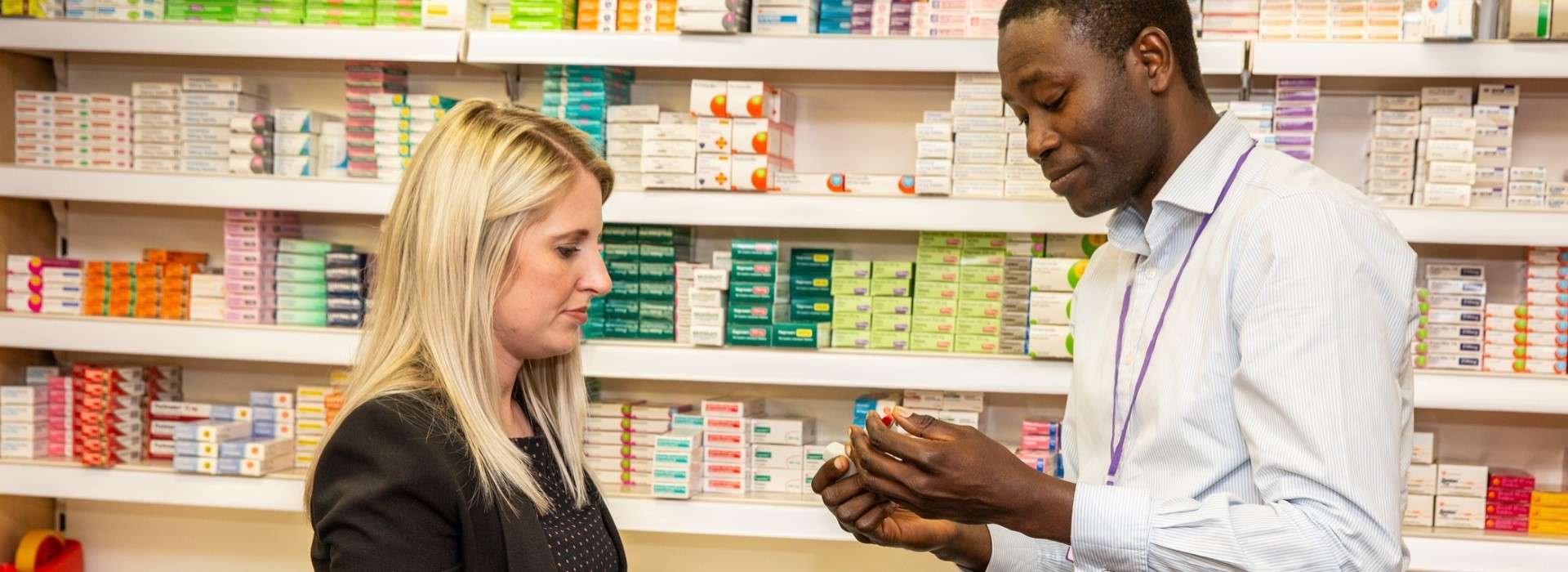The online MSc Clinical Pharmacy Practice course at Robert Gordon University will equip you with the necessary knowledge and skills to have a positive impact on patients’ lives and make a difference in the field of clinical practice.
This course has been designed to deliver a broad education in clinical pharmacy for all qualified Pharmacists irrespective of their country of undergraduate study or practice, and provides an opportunity to focus your studies more specifically to your area of practice. It will provide you with the necessary knowledge and skills to enhance your decision-making and patient care abilities.
PgCert (Stage 1)
8 months, January - August
The first two modules are common and are studied over 2 terms. Pharmaceutical Care Planning (30 credits) focuses on the development and implementation of evidence-based pharmaceutical care plans for patients and Therapeutics (30 credits) covers a wide-range of therapeutic topics.
PgDip (Stage 2)
16 months, September - May
In this stage you will choose two 30-credit modules from the three options:
- Collaborative working in medicines management
- Prescribing and service development
- Person centred care
MSc (Stage 3)
28 months, September - May
In this stage you will undertake Healthcare Research – and develop skills and expertise in relation to research and development of pharmacy services.
Learning Methods
You will be taught part time via our virtual learning environment CampusMoodle, allowing you to develop clinical knowledge and skills while you remain in employment. Regular evening webinars are a feature providing opportunities for support, sharing of practice and input from subject experts.
The Course Leader is a central point for information and support with regard to the delivery of the course. It is also recommended that you have a work-placed mentor to provide local support and encouragement.
Activity Summary
- Mainly independent study augmented by a mix of small and large group working. 600 hours per stage. Approx. 15-20 hours per week.
How long is a Clinical Pharmacy Practice course?
The duration of the Clinical Pharmacy Practice MSc is 2 years 4 months.
Independent Study
All your materials will be provided online and are designed to allow self-assessment of learning needs.
Assessment
You will be provided with formative assessment opportunities including self-assessment questions and problem-based activities to ensure the achievement of each of the learning outcomes. You will complete and submit summative assessments in each module. The methods used for each module ensure authentic assessment and vary depending on the learning outcomes being assessed.
Typically students are assessed each year:
Year 1
- 3 written assignments, including essay
Year 2
- 1 written assignment, including essay
- 2 oral assessments
- 1 report
Feedback
We aim to provide you with feedback within 20 working days of hand-in for all written exams, coursework and practical exams.
Staff Delivering on this Course
Staff delivering this course are practiced academics, with active links to national industry bodies including the Royal Pharmaceutical Society and General Pharmaceutical Council.
The Course Leader is your central point for information and support with regard to the delivery of the course. You will be supported by e-tutors who are all practicing clinical pharmacy practitioners. They review the learning materials, provide real-life case scenarios and participate in the marking of practice related assessments. They facilitate discussion and learning within the modules and bring a unique practice-related perspective to learning.
Job Prospects
This course has been designed in collaboration with employers in both primary and secondary care to ensure that the course is kept up-to-date and in line with current practice and the demands of the workplace.
Your employer will benefit from your completion of this course as it is designed to enable you to develop in the key competency areas for clinical practice. This will mean that you are able to make a valuable contribution to the provision of clinical pharmacy services through the application of aspects of your learning in areas such as direct patient care, personal, problem-solving, and management and organisation.

Find out moreRGUflex
What is needed to study MSc Clinical Pharmacy Practice?
Applicants should have an undergraduate degree in pharmacy from a UK university or overseas equivalent, at a minimum of honours level and one years post-registration experience OR an integrated master's degree in pharmacy (MPharm) and professional registration OR in consultation with the course leader.
Applicants from Malta
English is taught as a first language in Malta and applicants from Malta are required to meet, and evidence, the following criteria:
- must have obtained their Pharmacy Undergraduate degree at master's level from the University of Malta, which is a provider of an undergraduate Pharmacy degree at master's level which is delivered and assessed in English.
- must have at least one year experience of working as a qualified Pharmacist.
Any Maltese applicant failing to meet these criteria will be subject to the standard University English language requirements.
Applicants from Austria
Austrian students seeking an English language waiver are required to meet, and evidence, the following criteria:
(i) Must have completed their final year Undergraduate Pharmacy Research thesis in the English language.
OR
(ii) Must have completed 6 months at a Higher Education Institution in the UK as part of the final year Undergraduate Pharmacy Research project.
OR
(iii) Must have completed a PhD thesis in the English language.
International Students
International students seeking an English language waiver are required to meet, and evidence, the following criteria:
(i) Must have obtained their Pharmacy Undergraduate degree at master's (MPharm) level from a UK University
OR
(ii) Must have obtained their Pharmacy Undergraduate degree at BSc (Hons) level from an international University equivalent to a UK BSc (Hons) degree recognised by UK NARIC and must be registered with the General Pharmaceutical Council (GPhC) and have worked in the UK
English Language Requirements
Applicants whose first language is not English should have an IELTS of 6.5 overall, with no component lower than 5.5, or an equivalent.
We accept a variety of in-country and secure English language tests, find out more:
Please note, some courses may require a higher standard of English than stated in this page. Contact admissions@rgu.ac.uk for further information.
Academic Year 2026-2027
Scottish Students
Part Time
| Online | ||
|---|---|---|
| Over 3 years | Year 1 | £3010 |
| Year 2 | £2920 | |
| Year 3 | £2920 | |
Rest of UK Students
Part Time
| Online | ||
|---|---|---|
| Over 3 years | Year 1 | £3010 |
| Year 2 | £2920 | |
| Year 3 | £2920 | |
International Students
Part Time
| Online | ||
|---|---|---|
| Over 3 years | Year 1 | £4890 |
| Year 2 | £4745 | |
| Year 3 | £4745 | |
Academic Year 2025-2026
Scottish Students
Part Time
| Online | ||
|---|---|---|
| Over 3 years | Year 1 | £3210 |
| Year 2 | £3210 | |
| Year 3 | £2130 | |
Rest of UK Students
Part Time
| Online | ||
|---|---|---|
| Over 3 years | Year 1 | £3210 |
| Year 2 | £3210 | |
| Year 3 | £2130 | |
International Students
Part Time
| Online | ||
|---|---|---|
| Over 3 years | Year 1 | £5210 |
| Year 2 | £5210 | |
| Year 3 | £3470 | |
Additional Costs
Some other costs are not included in the course fees:
- The cost of books that you may wish to purchase.
- Costs associated with any placement / study abroad
- Accommodation and Living Costs
- Printing
Alumni Discount
Robert Gordon University is delighted to offer a 20% discount on course fees for all alumni who have graduated from RGU.
Student Funding
Postgraduate students will normally make their own arrangements for payment of fees. However, there are a limited number of SAAS funded places on certain postgraduate courses.
Scholarships and Financial Awards
You may qualify for a scholarship or financial award:
Disclaimer
For new intakes, course fees are reviewed and published annually for each mode of delivery. Tuition fees are fixed for the duration of a course at the rate confirmed in the offer letter. For further information:
Any questions?
Get in touch with our Student Admissions Service and we'll do our best to help.

